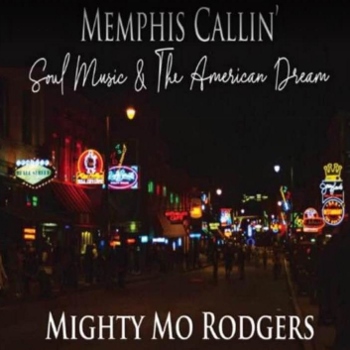If you’re going to use a superlative like “mighty” in your name, you’d better be able to back that claim up if you want to be taken seriously, especially over the course of a number of decades. We’re not sure when exactly Maurice Rodgers adopted the moniker of “Mighty Mo” Rodgers, but his own recording career since 1999 has certainly proven it to be more than just hyperbole. And that’s on top of the things he’d done earlier in his career, including playing with the likes of T-Bone Walker, Albert Collins, Bobby “Blue” Bland, and Jimmy Reed, and producing, playing on, and contributing songs to Sonny Terry and Brownie McGhee’s Sonny & Brownie album, among them, the still powerful “The Battle is Over (But the War Goes On)” that has since also been covered by the likes of Levon Helm, Shemekia Copeland, Sean Costello (our favorite version, at least until Mo himself records it!), and Oliver Wood.
Rodgers describes his latest album, Memphis Callin’: Soul Music & the American Dream (Drinking Gourd Records), as his “‘back to the future’ musical soul journey” and, in some ways, that’s exactly what it is, featuring four songs that Rodgers recorded back in the late 1970s with Booker T. and the MGs (at the time, Steve Cropper, Donald “Duck” Dunn and Willie Hall) in Hollywood after Booker heard Rodgers singing one of the songs, this album’s closing “Heart Be Still”, an extremely soulful, Ray Charles-like solo number with Rodgers on piano, and insisted they go into the studio to cut a record.
As Rodgers acknowledges in the album’s notes, that record deal never came about, with the studio tapes eventually lost. If it weren’t for a cassette copy of these songs, the world might never have heard the pure magic that transpired in that studio, with the tracks that Rodgers and the MGs recorded back then still sounding great today and pairing up quite nicely next to the album’s more recent songs, collectively honoring the soul music legacy.
Among the other vintage tracks, “Woman of the Rain” is a harmonica-accented, poem-inspired rocker with a John Nemeth/early Robert Cray sound, while the other two numbers see Rodgers paying homage to places he loves: just try not to enjoy the sway of the grooving “San Francisco,” which Rodgers praises with a refrain of “you’re a holiday, drive my blues away,” while “Indiana (Calls My Name)” is a bit more uptempo, Bob Seger-at-Muscle Shoals kind of track dedicated to the state where Rodgers grew up.
But Rodgers isn’t done traveling the States there, visiting the city of Memphis both through a Martin Luther King-inspired “The March” that relects upon King’s famous “Mountaintop” speech at the city’s Mason Temple and references the Lorraine Motel at which King was assassinated the following day but encourages us all to “keep on moving” and the album’s soulful opening title track, a swaying ode that celebrates the city as “the crossroads of the nation/ where soul music and rock n’ roll was the new liberation,” including mentions of some of its greatest musical offerings, including Sun Records, Otis Redding (“singing his heart out to you”), and of course Rodgers’ old pals Booker T. and the MGs (“layin’ down a groove”). It’s there that Rodgers says “I’m goin’ back in time, where I can find/ music from the soul” in a song that will call out to you just as Rodgers sings of the city doing to him.
That’s followed by the hard-driving “Sing for Your Supper,” featuring such lyrical gems as “There were times when I felt so low, I didn’t know where I would go/ but then a voice inside of me said ‘sing, Mo, sing, and you will be free'” and “But there’s one thing you better know: You’re only as good as your very last show”.
Mo slows things down a bit with a mellow, heartwrenching “Love, Love, Love” and pleading, slow-grooved “Bad, Bad Luck” before picking it back up with the funky, strutting “The Chitlin Circuit,” with the swaying, slow-dance-ready “If Reincarnation is True” rounding out the album’s numbers.
The music from both Booker T. and the MGs and the Italian band with which Rodgers recorded the newer tracks is of course world-class, adding some nice horns, piano, guitar, harmonica and drums throughout the album, once, that is, you make a point to listen for them after being awed by Mo’s, yes, we’ll say it, “mighty” vocals.
Like many of Mo’s projects, this one is so good from start to finish that it could easily be mistaken for a greatest hits compilation, and is as fine a soul record as you’ll hear from any of the other old soul masters or new voices of the genre. Here’s hoping that Rodgers will continue to listen to that voice inside of him and “sing, Mo, sing” for many albums still to come!

